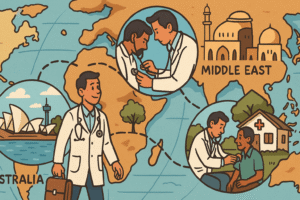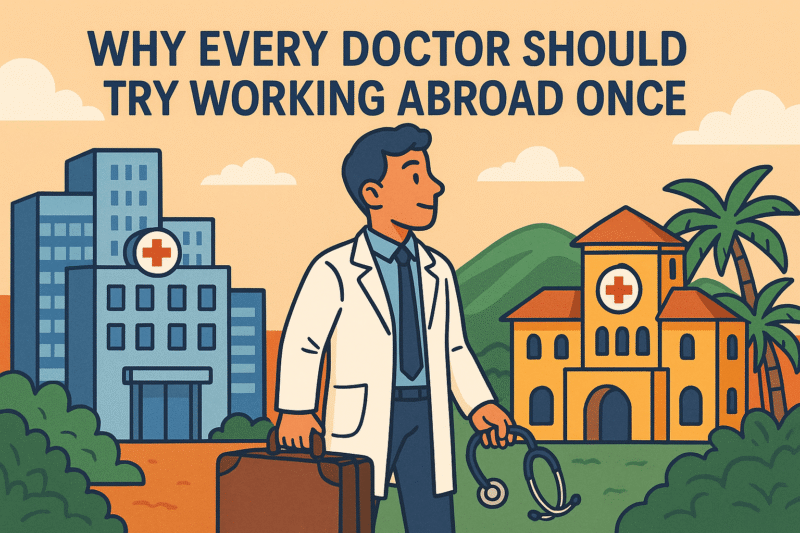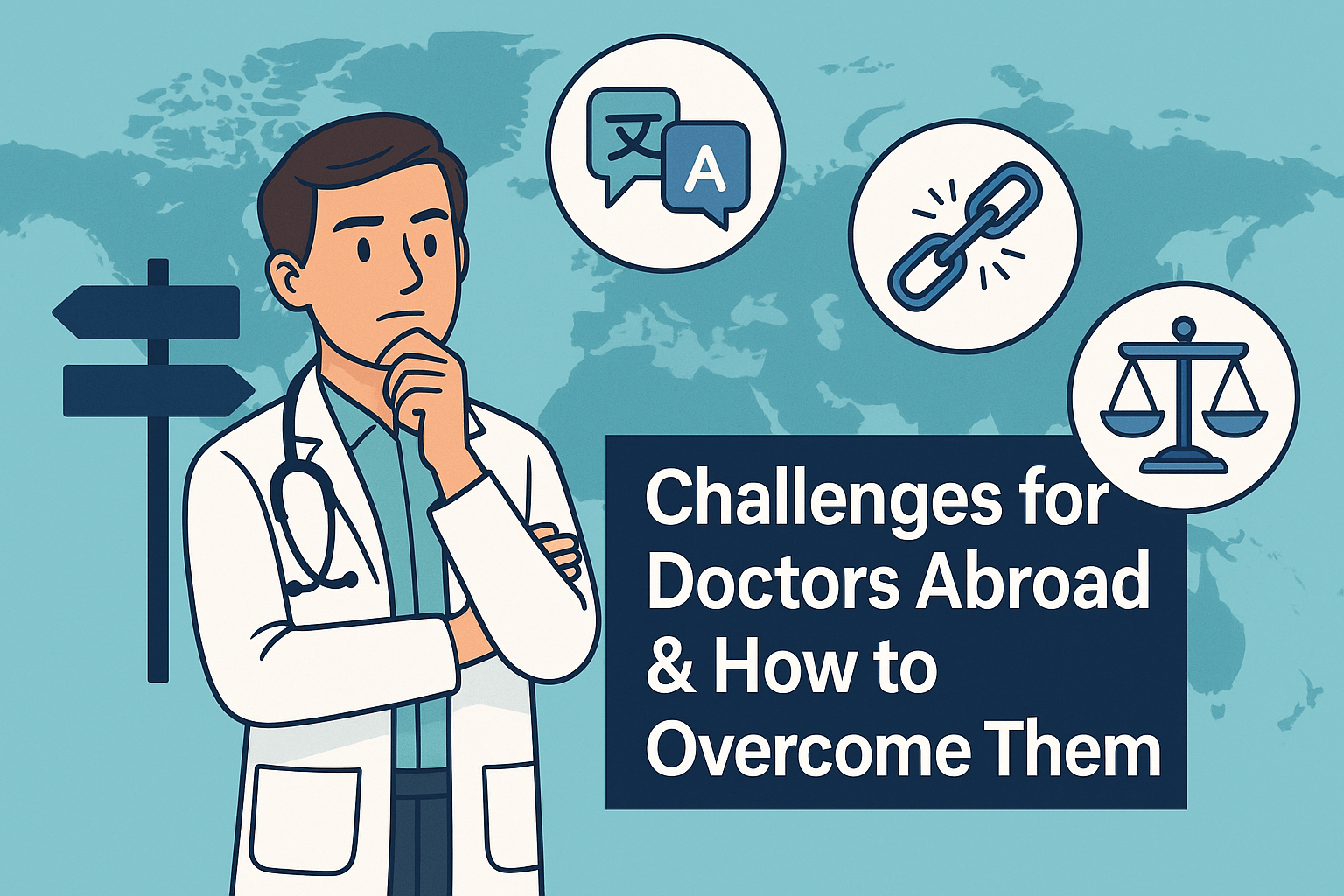Have you ever wondered what it’s like to trade your familiar hospital for a new system on another continent? Working abroad as a doctor isn’t just a resume bullet — it can reshape your clinical skills, worldview, and even your sense of purpose. In this article, I’ll walk you through exactly why every doctor should try working abroad once, covering both the promise and the pitfalls — so you can decide if this leap is right for you.
The Major Benefits of Working Abroad for Doctors
Expand Your Clinical Skillset
When you’re working abroad, especially in resource-limited settings, you’ll often confront cases or disease patterns you rarely see at home. You’ll sharpen diagnostic skills and often depend less on advanced imaging, reactivating the “art of medicine.” As one physician put it, “Working abroad in medicine in facilities with limited resources opens your eye to the abundance of resources in the United States.” MDLinx

Gain Cultural Sensitivity & Communication Strength
Caring for patients from different backgrounds forces you to refine how you communicate — not just in language, but in empathy, listening, and respecting cultural health beliefs. Doctors with international experience are often more adept at navigating language barriers and adapting medical explanations to diverse audiences. gmedical.com
Boost Your Career & Marketability
Employers increasingly value global experience. Working abroad can set you apart by demonstrating flexibility, resilience, and cross-cultural competence. In many healthcare systems, applicants with international experience are seen as stronger candidates for leadership or teaching roles.
Renew Your Passion & Escape Burnout
After years of routine, many doctors feel burnout creeping in. A stint abroad is like a reset button: new challenges, new routines, new environments. This fresh experience often reignites curiosity and motivation. Some call it an “international sabbatical” that refreshes one’s perspective.
Real Challenges When Working Abroad
Navigating Licensing & Credentialing
One of the biggest barriers is figuring out how to legally practice in a foreign country. Each nation has its own medical licensing body, exams, and requirements. In the U.S. for example, international medical graduates (IMGs) often must complete 1–3 years of accredited residency or equivalent practice before applying for licensure. American Medical Association+1 In Australia, overseas trained doctors must pass AMC exams before obtaining full registration.
Cultural & Personal Adjustment
Adjusting to new norms, social customs, medical hierarchies, and local expectations isn’t easy. Many doctors feel isolation, culture shock, or “imposter syndrome” at first.
Resource Limitations & System Frustrations
You may face constraints in diagnostics, drug availability, or infrastructural support. That can be frustrating, especially if you’re used to well-resourced settings.
Financial and Contract Uncertainty
While some overseas contracts pay well, others may not match expectations once cost-of-living and taxation are factored in. Also, relocation support, housing, visa sponsorship — these details vary wildly.
How to Prepare for Working Abroad Successfully
Research Licensing & Regulations Early
Before committing, dig deep into the destination country’s medical regulatory body. For example, Canada has clear “Pathways to Licensure” for foreign doctors. Medical Council of Canada | Understand exams, supervised periods, and local practice rules.
Start with Short-Term or Locum Roles
If possible, begin with a temporary contract or locum assignment. This gives you a feel for the system without long-term obligations. It’s a stepping stone to longer stays.
Build Local & Global Networks
Connect with physicians who’ve already worked abroad. Ask them about licensing, lived experience, and hidden challenges. Join expatriate medical groups or forums.
Plan Well for Logistical & Personal Aspects
Arrange housing, visas, insurance, banking, family arrangements, and language preparation in advance. Even small oversights can derail the first months.
Top Countries & Regions Where Working Abroad Can Excel
Here are a few destinations often recommended for doctors seeking international experience:
-
Australia & New Zealand — Good IMG pathways, stable systems, high quality of life.
-
United Arab Emirates & Middle East — Rapidly expanding healthcare sector, competitive compensation.
-
United Kingdom / NHS — Many doctors seek the UK for postgraduate training and international exposure.
-
Developing nations / rural settings — Offers unique clinical challenges, sometimes under supervision roles, teaching, or NGO partnerships.

Frequently Asked Questions About Working Abroad
Is working abroad worth it for a doctor?
Yes — beyond financial gains, it’s a chance to grow in resilience, cross-cultural understanding, and clinical versatility.
What are the risks of working abroad?
Risks include licensing delays, undervalued compensation, isolation, and poorly defined contracts. It’s essential to vet every detail before signing.
How long should I commit when I first try working abroad?
A 6–12 month contract is often a good trial period. It’s long enough to adjust but short enough to maintain flexibility.
Will it hurt my medical registration back home?
Not usually — many doctors return without penalty. But check your home country’s medical board rules, especially around continuous practice or gaps in service.
How do I find reliable jobs abroad?
Use international physician recruitment sites, hospital networks, embassy medical divisions, and expatriate medical communities to find vetted roles.
Conclusion
Working abroad may be the single most transformational choice you make in your medical career. It pushes your boundaries, sharpens your skills, and refreshes your sense of purpose. Even if you only try it once, that experience will stay with you forever — in how you care for patients, teach peers, and see the world.









1 comment
Thanks